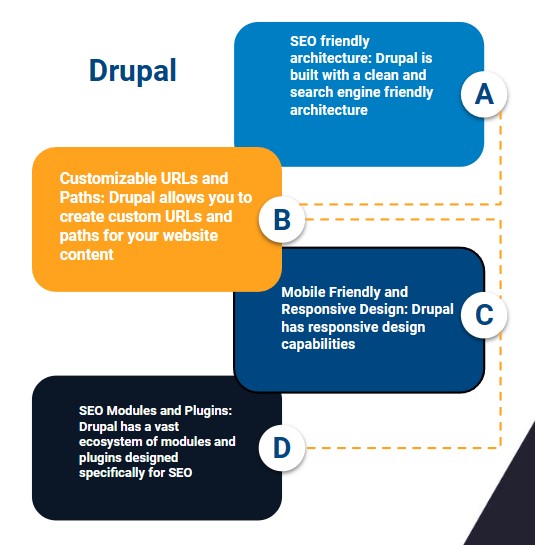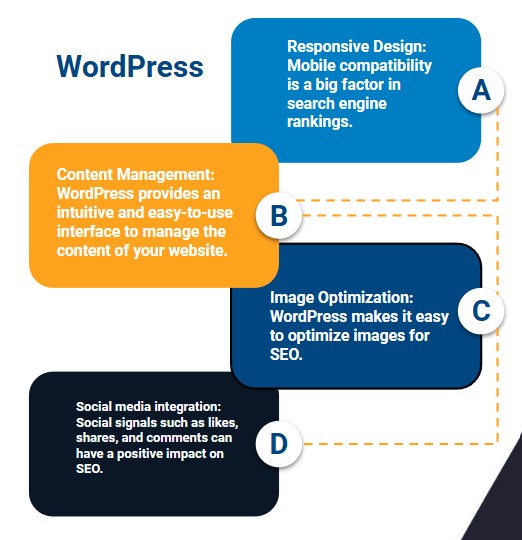Increasing visits to a web page is essential when seeking to promote or publicize a product or service. Companies in the world have chosen, in addition to building attractive and user-friendly web pages, optimizing SEO, working with Drupal or WordPress.
SEO is an acronym for Search Engine Optimization. It is a solution that is applied to web pages so that they are positioned in search engines, such as Google for example, and appear among the first search results.
Where does SEO apply?
This technique is applied both in the content: blogs, articles, written in the home page, landing pages, as well as in the design of the user interface and in the code with which the web page is built, so it is very important choose the appropriate framework or language.
In general, CMS-type web pages are the ones that are most used for SEO and the specialized frameworks for developing CMS are Drupal and Wordpress. Let's take a look at what makes each of them the best for optimizing content for search engines.
Advantages of using Drupal and Worpress for SEO optimization
Each of these frameworks presents important characteristics to optimize the SEO of a web page.
Let's start with Drupal and its benefits:
- SEO Friendly Architecture: Drupal is built with a clean and search engine friendly architecture, allowing search engines to easily crawl and index your website content. It generates clean URLs, uses proper HTML markup, and provides options to optimize metadata.
- Customizable URLs and Paths: Drupal allows you to create custom URLs and paths for your website content, giving you control over keyword placement and making it easier for search engines and users to understand your site's structure.
- Content Categorization and Taxonomy – Drupal's robust taxonomy system allows you to effectively categorize and organize your content. By creating logical taxonomy vocabularies and tagging content appropriately, you can improve site navigation, user experience, and search engine visibility.
- Mobile Friendly and Responsive Design: Drupal has responsive design capabilities, allowing you to create mobile friendly websites that are essential for SEO. With the use of mobile devices on the rise, search engines prioritize mobile-optimized websites in their rankings.
- SEO Modules and Plugins: Drupal has a vast ecosystem of modules and plugins designed specifically for SEO. These tools can help you implement advanced SEO techniques such as XML sitemaps, schema markup, canonical URLs, social media integration, and more.
- Multilingual Capabilities: Drupal provides full multilingual support, allowing you to build websites in multiple languages. This feature can help you target international audiences and improve your website's visibility in global search results.

For its part, Wordpress has several features that could put it above Drupal for some of the SEO specialists. Here some of them:
- Responsive Design: Mobile friendliness is an important factor in search engine rankings, as search engines prioritize websites that provide a good user experience on mobile devices.
- SEO Plugins: WordPress offers a wide selection of SEO plugins, such as Yoast SEO and All in One SEO Pack, which provide advanced optimization features. These plugins allow you to optimize metadata, generate XML sitemaps, implement schema markup, analyze keyword usage, and more, helping you improve your website's SEO performance.
- Content Management: WordPress provides an intuitive and easy-to-use interface to manage the content of your website. This makes it easy to regularly update and publish high-quality SEO-optimized content, which is crucial for improving search engine rankings.
- Customizable Permalinks: WordPress allows you to create custom permalinks, allowing you to optimize URLs for better search engine visibility. You can include relevant keywords in your URLs and structure them to reflect the hierarchy and organization of your website content.
- Image Optimization: WordPress makes it easy to optimize images for SEO. It provides options to add alt tags and descriptions to your images, helping search engines understand the context and relevance of the images on your website.
- Social media integration: Social signals such as likes, shares, and comments can have a positive impact on your website's SEO by increasing your visibility and engagement.
- Fast Load Times: Website speed is an essential factor in SEO as search engines prioritize fast loading websites. WordPress offers caching plugins such as W3 Total Cache and WP Super Cache that can significantly improve your website's performance and load times.

With all these benefits of Drupal and WordPress it is difficult to choose which is the best in terms of SEO optimization, it all comes down to what the project needs. At Rootstack we have experts in both technologies who are immediately available to help you.
We recommend you on video


